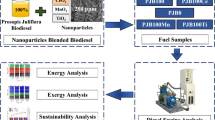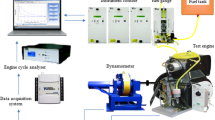Abstract
The present research work was conducted on a compression ignition engine to assess the engine characteristics fueled with the blend of diesel and high-oxygenated additives such as ethanol. Ethanol does not easily blend with diesel. In order to attain a homogeneous mixture, a small amount of additive is added to the blend. Different additives were added to the blend to form a homogeneous mixture. Stability test was conducted on the blend to ensure prolonged homogeneity. The additives used for the test purpose were isopropanol, oleic acid, and ethylene acetate. From the stability results, it was found that oleic acid was the best additive which produces a better homogenous mixture for the blend of ethanol and diesel. One percentage of oleic acid is used as an additive to blend ethanol and diesel. The different combinations of blend ratios used for the test purpose were D90E10, D80E20, and D70E30. All the aforementioned blends have low cetane number because of ethanol, which was compensated by adding 1% DEE (diethyl ether) to all the blends. Experimental results exhibit that there is an improvement in the performance characteristics, such as brake thermal efficiency (BTE) and specific energy consumption (SEC), with the enrichment of DEE in ethanol-diesel blend. It is also noticed that the blend without DEE exhibited lower magnitude. This is mainly due to higher energy content and cetane number of DEE. Emission characteristics, like hydrocarbon (HC) and carbon monoxide (CO), were found to drastically increase with the increase in the ethanol concentration in the diesel blend. This is attributed to higher latent heat of vaporization (LHV) of ethanol present in the blend. Combustion pressure and heat release rate of the DEE-enriched ethanol blends were higher by 2.2 % and 2.4 %, respectively, when compared with their corresponding blends without DEE. This is a result of higher volatility of DEE which leads to better combustion.

Graphical abstract











Similar content being viewed by others
Availability of data and materials
The source of data and materials of this study is available from the corresponding author, upon reasonable request.
Abbreviations
- aTDC:
-
After top dead center
- BP:
-
Brake power
- BSEC:
-
Brake specific energy consumption
- bTDC:
-
Before top dead center
- BTE:
-
Brake thermal efficiency
- CN:
-
Cetane number
- CO:
-
Carbon monoxide
- CO2 :
-
Carbon dioxide
- CV:
-
Calorific value of fuel
- DEE:
-
Diethyl ether
- ID:
-
Ignition delay
- J:
-
Joule
- kg:
-
Kilogram
- kJ:
-
Kilojoule
- kW:
-
Kilowatt
- LHV:
-
Latent heat of vaporization
- mJ:
-
Megajoule
- NOx :
-
Oxides of nitrogen
- SOC:
-
Start of combustion
- UBHC:
-
Unburnt hydrocarbon
- IC:
-
Internal combustion
- D90E10:
-
90% diesel and 10% ethanol in volume
- D80E20:
-
80% diesel and 20% ethanol in volume
- 70E30:
-
70% diesel and 30% ethanol in volue
- HRR:
-
Heat release rate
- EGT:
-
Exhaust gas temperature
References
Alptekin E (2017) Evaluation of ethanol and isopropanol as additives with diesel fuel in a CRDI diesel engine. Fuel 205:161–172. https://doi.org/10.1016/j.fuel.2017.05.076
Bragadeshwaran A, Kasianantham N, Ballusamy S, Tarun KR, Dharmaraj AP, Kaisan MU (2018) Experimental study of methyl tert-butyl ether as an oxygenated additive in diesel and Calophyllum inophyllum methyl ester blended fuel in CI engine. Environ Sci Pollut Res 25(33):33573–33590. https://doi.org/10.1007/s11356-018-3318-y
Chang YC, Lee WJ, Wu TS, Wu CY, Chen SJ (2014) Use of water containing acetone-butanol-ethanol for NOx-PM (nitrogen oxide-particulate matter) trade-off in the diesel engine fueled with biodiesel. Energy 64(x):678–687. https://doi.org/10.1016/j.energy.2013.10.077
De Menezes EW, Da Silva R, Cataluña R, Ortega RJC (2006) Effect of ethers and ether/ethanol additives on the physicochemical properties of diesel fuel and on engine tests. Fuel 85(5–6):815–822. https://doi.org/10.1016/j.fuel.2005.08.027
Ferreira VP, Martins J, Torres EA, Pepe IM, De Souza JMSR (2013) Performance and emissions analysis of additional ethanol injection on a diesel engine powered with a blend of diesel-biodiesel. Energy Sustain Dev 17(6):649–657. https://doi.org/10.1016/j.esd.2013.08.005
Gnanamoorthi V, Devaradjane G (2015) Effect of compression ratio on the performance, combustion and emission of di diesel engine fueled with ethanol–Diesel blend. J Energy Inst 88(1):19–26. https://doi.org/10.1016/j.joei.2014.06.001
Górski K, Przedlacki M (2014) Evaluation of the influence of diethyl ether (DEE) addition on selected physicochemical properties of diesel oil and ignition delay period. Energy Fuel 28(4):2608–2616. https://doi.org/10.1021/ef4025036
Guo L, Yan YY, Tan M, Li H, Peng Y (2011) An experimental study on improving the ignition of ethanol-diesel blended fuel (EDBF). Chem Eng Commun 198(10):1263–1274. https://doi.org/10.1080/00986445.2010.525208
Hariz HB, Takriff MS (2017) Palm oil mill effluent treatment and CO2 sequestration by using microalgae—sustainable strategies for environmental protection. Environ Sci Pollut Res 24(25):20209–20240. https://doi.org/10.1007/s11356-017-9742-6
Ibrahim A (2018) An experimental study on using diethyl ether in a diesel engine operated with diesel-biodiesel fuel blend. Eng Sci Technol Int J 21(5):1024–1033. https://doi.org/10.1016/j.jestch.2018.07.004
Janakiraman S, Lakshmanan T, Chandran V, Subramani L (2020) Comparative behavior of various nano additives in a DIESEL engine powered by novel Garcinia gummi-gutta biodiesel. J Clean Prod 245:118940. https://doi.org/10.1016/j.jclepro.2019.118940
Liu H, Wang X, Wu Y, Zhang X, Jin C, Zheng Z (2019) Effect of diesel/PODE/ethanol blends on combustion and emissions of a heavy duty diesel engine. Fuel 257(June):116064. https://doi.org/10.1016/j.fuel.2019.116064
Nabi MN, Rahman SMA, Bodisco TA, Rasul MG, Ristovski ZD, Brown RJ (2019) Assessment of the use of a novel series of oxygenated fuels for a turbocharged diesel engine. J Clean Prod 217:549–558. https://doi.org/10.1016/j.jclepro.2019.01.249
Kazemi Shariat Panahi, H., Dehhaghi, M., Kinder, J. E., & Ezeji, T. C. (2019). A review on green liquid fuels for the transportation sector: a prospect of microbial solutions to climate change. Biofuel Research Journal, 6(3), 995–1024. https://doi.org/10.18331/BRJ2019.6.3.2
Parthasarathy M, Lalvani JIJR, Prakash E, Jayaraj S, Annamalai K (2014) Experimental investigation on combustion and emission characteristics of modified piston in an IDI diesel engine fueled with ethyl alcohol. In Adv Mater Res 984–985:873–877. https://doi.org/10.4028/www.scientific.net/AMR.984-985.873
Parthasarathy M, Ramkumar S, Isaac Joshua Ramesh Lalvani J (2019) Influence of various flow rates of CNG in CI engine with blend of Tamanu methyl ether and ethanol. Int J Veh Struct Syst 11(2). https://doi.org/10.4273/ijvss.11.2.06
Parthasarathy M, Ramkumar S, Isaac JoshuaRamesh Lalvani J, Elumalai PV, Dhinesh B, Krishnamoorthy R, Thiyagarajan S (2020) Performance analysis of HCCI engine powered by tamanu methyl ester with various inlet air temperature and exhaust gas recirculation ratios. Fuel 282(March):118833. https://doi.org/10.1016/j.fuel.2020.118833
Qi DH, Chen H, Geng LM, Bian YZ (2011) Effect of diethyl ether and ethanol additives on the combustion and emission characteristics of biodiesel-diesel blended fuel engine. Renew Energy 36(4):1252–1258. https://doi.org/10.1016/j.renene.2010.09.021
Ramalingam K, Balasubramanian D, Chellakumar PJTJS, Padmanaban J, Murugesan P, Xuan T (2020) An assessment on production and engine characterization of a novel environment-friendly fuel. Fuel 279(April):118558. https://doi.org/10.1016/j.fuel.2020.118558
Shaafi T, Velraj R (2015) Influence of alumina nanoparticles, ethanol and isopropanol blend as additive with diesel-soybean biodiesel blend fuel: combustion, engine performance and emissions. Renew Energy 80:655–663. https://doi.org/10.1016/j.renene.2015.02.042
Torres-Jimenez E, Jerman MS, Gregorc A, Lisec I, Dorado MP, Kegl B (2011) Physical and chemical properties of ethanol-diesel fuel blends. Fuel 90(2):795–802. https://doi.org/10.1016/j.fuel.2010.09.045
Yesilyurt MK, Aydin M (2020) Experimental investigation on the performance, combustion and exhaust emission characteristics of a compression-ignition engine fueled with cottonseed oil biodiesel/diethyl ether/diesel fuel blends. Energy Convers Manag 205(October 2019):112355. https://doi.org/10.1016/j.enconman.2019.112355
Yilmaz N, Vigil FM, Benalil K, Davis SM, Calva A (2015) Erratum: Effect of biodiesel-butanol fuel blends on emissions and performance characteristics of a diesel engine (Fuel (2014) (46-50)). Fuel 139:781. https://doi.org/10.1016/j.fuel.2014.09.019
Acknowledgments
We express our profound thanks to the Vel Tech Rangarajan Dr. Sagunthala R&D Institute of Science and Technology, Chennai, for providing us with a laboratory facility to perform this research.
Author information
Authors and Affiliations
Contributions
RS conducted investigation on blends stability. PM carried out to test engine fueled with DEE-enriched ethanol blend. GGG examined the brief literature review on influence of ethanol blend in diesel fuel. BD analyzed the combustion characteristics of engine. All authors read and approved the final manuscript.
Corresponding authors
Ethics declarations
Ethical approval and consent to participate
Ensure that all the authors mentioned in the manuscript have agreed for authorship, read and approved the manuscript, and given consent for submission and subsequent publication of the manuscript.
Competing interests
The authors declare that they have no competing interests.
Additional information
Responsible Editor: Philippe Garrigues
Publisher’s note
Springer Nature remains neutral with regard to jurisdictional claims in published maps and institutional affiliations.
Rights and permissions
About this article
Cite this article
Shanmugam, R., Murugesan, P., Guye, G.G. et al. Effect of additives on the stability of ethanol-diesel blends for IC engine application. Environ Sci Pollut Res 28, 12153–12167 (2021). https://doi.org/10.1007/s11356-020-10934-6
Received:
Accepted:
Published:
Issue Date:
DOI: https://doi.org/10.1007/s11356-020-10934-6




